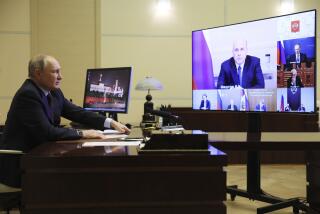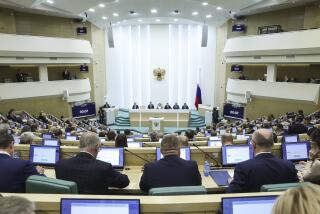Balm for the Chinese Threat
- Share via
Remember the Chinese nuclear spying flap? The one that took Washington by storm earlier this year and led to a major reorganization of the Energy Department and strained U.S.-China relations? Well, it appears that many Washington senators have forgotten all about it. For if they had not, they would be throwing their support behind the Comprehensive Test Ban Treaty instead of threatening to defeat it.
To actually damage U.S. security, nuclear weapons information that may have been lost (or that may be lost in the future) must be turned into weapons, and the treaty would create a very high barrier against this. Whatever information on thermonuclear weapons China may have obtained, it is not credible that Beijing would deploy weapons that incorporate this information without first conducting nuclear explosive tests outlawed by the treaty. China signed the pact in 1996 and has not conducted any nuclear explosive tests since. But the treaty cannot enter into force--and the verification system cannot be fully implemented--until the U.S. Senate provides its advice and consent to the president.
The report of the House Select Committee led by Rep. Christopher Cox (R-Newport Beach) states that “If [China] violates the Comprehensive Test Ban Treaty by testing surreptitiously, it could further accelerate its nuclear development.” An even more serious problem is that without the treaty, China would be entitled to conduct nuclear tests openly and make gains that could in no way be redressed by the resumption of testing by the United States.
The Senate has the power to help prevent this from happening. With the treaty in force and its verification system operational, China and other nations would be unable to conduct clandestine nuclear tests of even the triggers for smaller and lighter thermonuclear warheads for use on long-range ballistic missiles. This is the central security value of the treaty, and one the Senate cannot afford to ignore.
We may never know whether Chinese nuclear weapons development benefited significantly from espionage. According to the April 21 damage assessment prepared by the U.S. intelligence community and reviewed by an independent panel chaired by Adm. David Jeremiah, “China’s technical advances have been made on the basis of classified and unclassified information derived from espionage, contact with U.S. and other countries’ scientists, conferences and publications, unauthorized media disclosures, declassified U.S. weapons information and Chinese indigenous development. The relative contribution of each cannot be determined.”
Even if China did acquire detailed design information on sophisticated nuclear weapons, there is no basis to assume that China would field a warhead based on this information without new nuclear tests. Computer simulations alone cannot provide confidence that a new thermonuclear weapon will perform properly.
The likelihood that other countries with relatively little nuclear weapons experience are involved in spying makes the case for the treaty even more compelling. Nuclear explosive testing would be more important to nations that do not already have sophisticated, well-tested designs than it is now for China.
Nuclear proliferation, aided by espionage or not, is one of the greatest threats to American security. U.S. ratification and making the treaty enforceable will strengthen the nation’s ability to contain this threat. To limit the damage from nuclear espionage, past or future--or for that matter, from foreign nuclear weapons advances, whatever their source--the Senate should ratify the test ban treaty.
More to Read
Sign up for Essential California
The most important California stories and recommendations in your inbox every morning.
You may occasionally receive promotional content from the Los Angeles Times.










